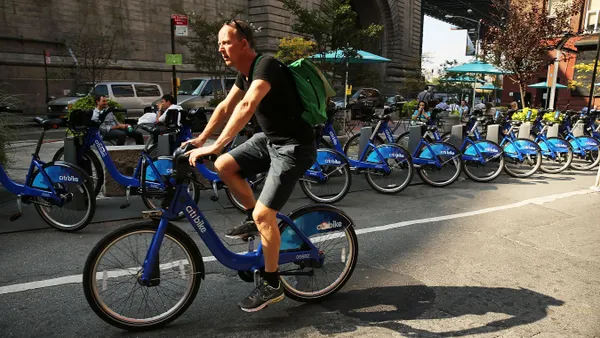Dive Brief:
- Cars and vans are improperly parked far more than scooters or bicycles on city streets, according to a new study published in the journal Transportation Research Interdisciplinary Perspectives.
- Ride-hail, taxi, delivery and commercial vehicles are improperly parked a collective 64% of the time, compared to just 0.8% of bicycles and 1.7% of scooters. The report also found that 24.7% of personal cars park improperly.
- The study looked at 3,600 bikes, scooters and cars/vans across five U.S. cities: San Francisco; Santa Monica, CA; Portland, OR; Washington, DC; and Austin, TX.
Dive Insight:
Micromobility has taken cities and their curbsides by storm. Improperly parked scooters have become a major source of complaints among city residents, leaders and disability rights advocates.
But the attention paid to improperly parked scooters, might actually be overshadowing the real culprits of most parking violations: cars.
Parking reform shouldn't just be focused on the newest modes of transportation, report co-author Anne Brown told Smart Cities Dive. It needs to be more comprehensive, she said.
"Despite a media outcry that new micromobility services litter city sidewalks, we find little evidence that these vehicles are impeding access for sidewalk travelers, even on the busy downtown streets we observed," the report reads.
City curbside competition has seemingly never been more intense. And with urban last-mile deliveries expected to grow 78% by 2030, that competition will likely continue to heat up.
Cities are trying a number of solutions to encourage better car parking and decrease the demands put on curbs. For instance, Columbus, OH introduced a pilot with CurbFlow to address delivery growth. The city also added clearly marked "Loading Management Zones" for commercial and private vehicles doing commercial work.
CurbFlow also revealed positive results in Washington, DC with a three-month pilot that cut back on double parking by 64%, improving safety for crosswalks and bikers. And in Chicago, urban solutions accelerator City Tech Collaborative is working to help the city understand its curbside demands to ultimately improve curbside pricing and operations.
Although scooters may represent a small percentage of parking violations, many cities are still responding to resident complaints and experimenting with loading zones or parking corrals. Spin, for example, recently rolled out its first public charging hubs in Phoenix in February.
To continue getting ahead of micromobility parking woes, the report suggests that cities engage in public education and invest in proper parking infrastructure.
"User behavior and parking practices appear to be improving as time and experience progress, but cities will continue to play an important role in encouraging orderly operation and parking, just as they have for motor vehicles for decades," according to the report.










